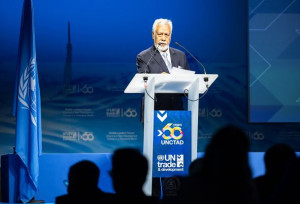Prime Minister calls on UN and UNCTAD to strengthen support for fragile countries and promote peace and development

Prime Minister Kay Rala Xanana Gusmão was a keynote speaker at the Global Leaders Forum, held as part of the 60th anniversary of the United Nations Conference on Trade and Development (UNCTAD). Under the theme “Charting a new course for development in a changing world”, the event occurred between June 12th and 14th in Geneva, Switzerland.
Representing the President of the Republic, José Ramos-Horta, the Prime Minister stated that “Since its establishment in 1964, UNCTAD has been on the frontline of economic and geo-political change, fighting for a fairer economic system”.
He further emphasised that “UNCTAD’s 60th Anniversary provides an opportunity for us to discuss new approaches to tackle these challenges” of today in a “world of growing conflict and disorder, where international law is applied selectively by the developed world”. In addition, we face “a climate emergency, caused by the industrialised countries, that impacts the developing world the most”. At the same time, “we have a global economy that is entrenching extreme inequality”.
The head of the Government emphasised the importance of inclusive, country-led development approaches, highlighting the creation of the g7+, a group of fragile countries that share experiences and defend a common voice on the international stage.
Xanana Gusmão highlighted Timor-Leste's recent accession to the World Trade Organisation, which “will help our integration with the global economy”. He also praised UNCTAD's Strategy to Support Small Island Developing States (SIDS), which “provides a framework for sustainable development, economic diversification and resilience building”.
The Prime Minister called on “the United Nations, and UNCTAD, to explore a better approach to provide support and assistance, so that we can open the door to peace and development in these fragile countries” and emphasised the need for UNCTAD to have “the political support needed to undertake its role and to chart a new model for international development”.










































